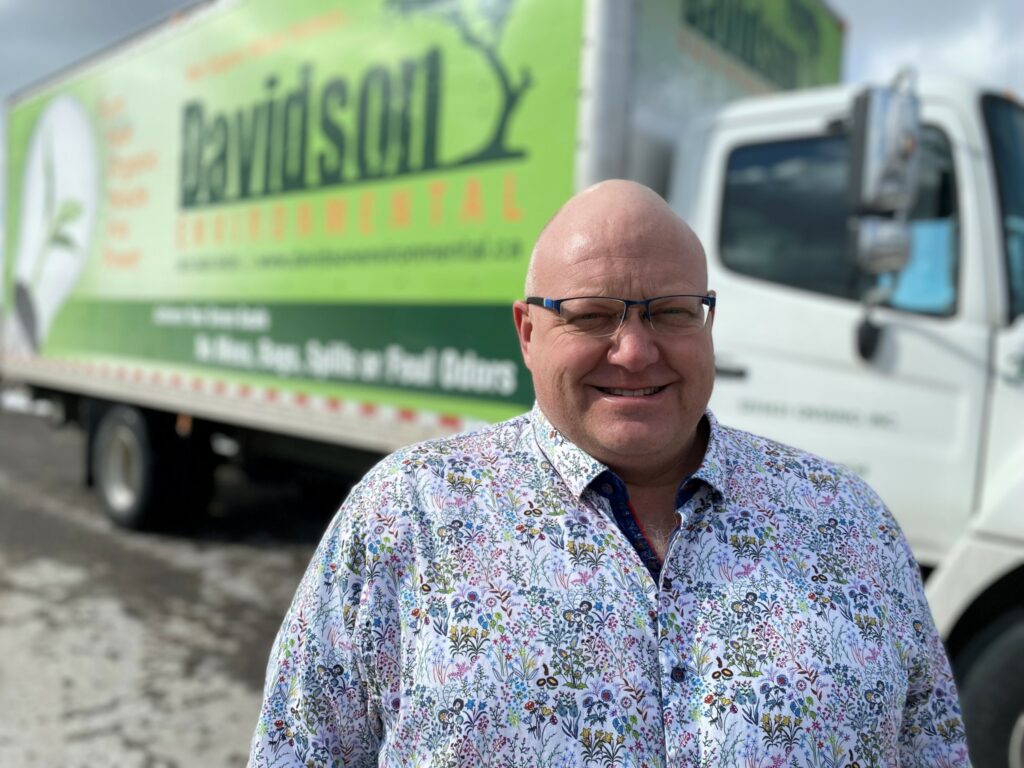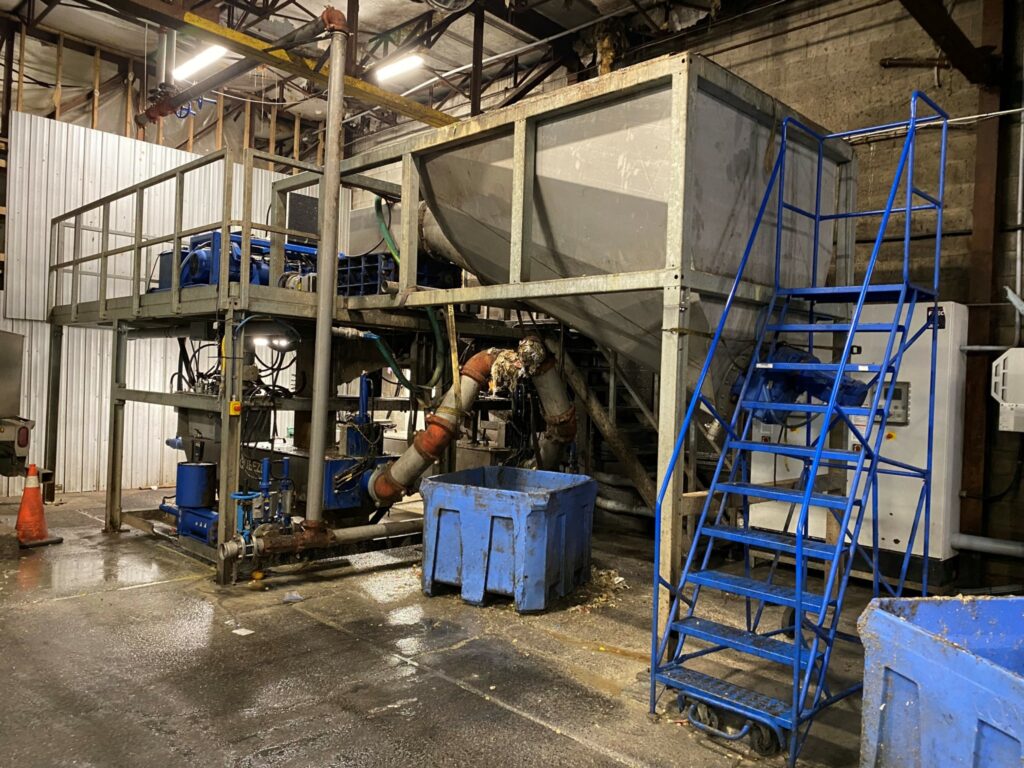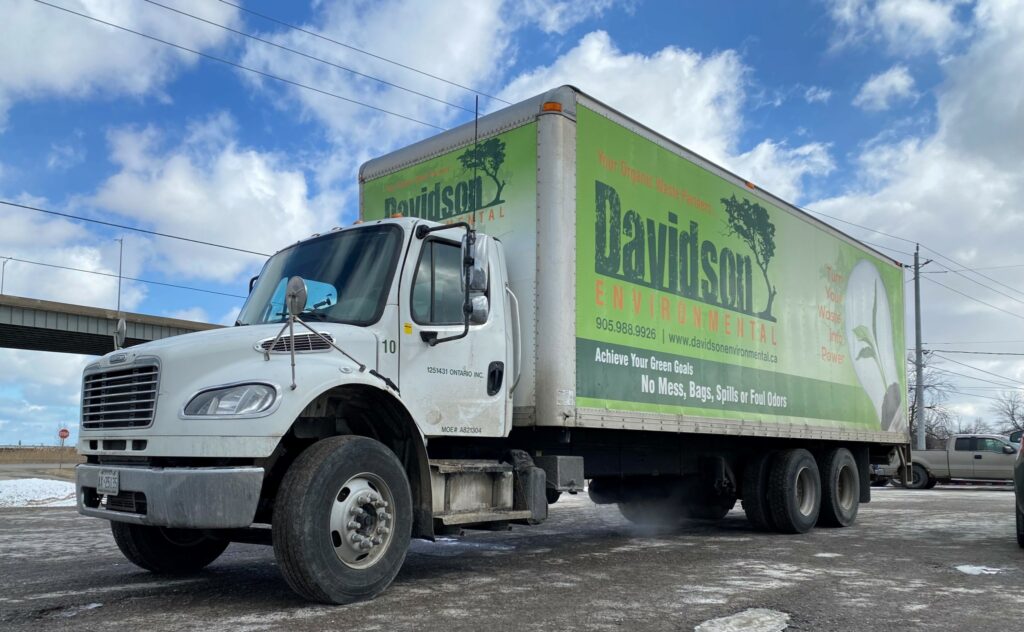Davidson Environmental turns organic waste into green energy
James Davidson is not your typical garbageman. Instead of collecting black garbage bags and sending them to overflowing landfill sites, Davidson Environmental and its fleet of trucks collects organic waste across Southern Ontario, sorts it, and converts it into green energy.
Davidson’s career in the refuse industry began at his local municipal recycling facility in St. Catharines, Ont., where he separated plastics from paper by hand. From there, he got his trucking licence and began collecting garbage before graduating to the office working on logistics such as route management.

He then went to Waste Management where he did similar work but saw an opportunity no one was pursuing locally.
“Nobody was doing organic waste at the time as a specialty,” Davidson recalls.
Meanwhile, Davidson’s father-in-law, who moved to Canada from Holland after WWII, offered insights into how advanced Europe was compared to North America in recycling organic materials. Davidson turned to Google and found someone who was making compost out of locally collected organics and in 1996, Davidson Environmental was formed.
The initial fleet consisted of a Saturn car pulling a small trailer with six compost bins.
“I worked for Waste Management in the day, and did this in the evening after supper, making dirt,” says Davidson.
Soon, he would upgrade the Saturn to a rear-loader garbage truck and scale up the business. But the real growth came about 10 years ago when two anaerobic digesters were built nearby. Suddenly, the organic material Davidson Environmental was collecting could be converted into more than just dirt, including green electricity and renewable natural gas.
Today, the fleet consists of 12 trucks – mostly single-axle Class 7 Hinos, but a couple tandem-axles for heavier loads and a Class 8. They cover from Windsor to Oakville, and Owen Sound to Fort Erie. Drivers will make about 10-20 collections a day at restaurants, grocery stores, schools, and casinos, swapping out clean bins for full ones and trucking them back to Davidson’s St. Catharine’s facility for sorting.

From there, the waste is fed through a $1-million depackaging machine – the only one of its kind in North America – which can remove any non-organic material. It can even scrape lasagna cheese off a piece of tinfoil while rejecting the foil itself. The machine also liquefies the waste for transfer to the local digesters by tanker trailer.
The company employs 37 staff, as well as five well-fed cats (and more kittens in training) who manage pest control. When Covid-19 shut down restaurants, schools, and casinos – all good sources of organic waste – the business was dealt a major blow.
“We took a whole shift out,” Davidson says of the effect Covid had. “It was devastating but we survived it,” he adds, noting the company has nearly returned to pre-pandemic volumes.
Davidson took advantage of the slow period to ramp up sales efforts. But getting new customers on-board isn’t as easy as you’d think.
“Everybody loves the idea,” he says. “It’s a price problem. We’re more expensive than garbage, so they really have to want to do the right thing. We strive every day to get the price disparity down, but it costs us money to turn it into green electricity.”
Davidson actually has to pay the anaerobic digester operators to take the waste, which they convert to green energy and feed back into the grid. In addition to selling suppliers on the environmental benefits, the service is also easier to manage than traditional garbage collection, Davidson notes. Drivers provide cleaned totes ranging in size from 120 to 360 liters, or barrels for grease collection. They also collect it regularly so it doesn’t sit long creating an odor.
“Our system is cleaner and easier to use than garbage,” Davidson says. “We take all the mess with us. The alternative is a garbage can and black garbage bags and it all goes to landfill.”
Drivers who can tolerate working with waste seem to enjoy the job, says Davidson. He spec’s the Hinos with top-of-the-line liftgates and other amenities to make their jobs easier, including Geotab’s ELD/DVIR system and Drivewyze’s PreClear scale bypass system that allows them to pass the scales.

“Drivers love it,” he says, “the scale is the worst part [of their day] because they never know how long they’re going to be there. The Hinos drive like Toyota Tercels. Great turning circle and super comfortable.”
The company operates a licensed shop and does its own maintenance and safeties in-house. While the trucks are diesel-fueled, Davidson is looking forward to the day he can order electric or hydrogen-fueled trucks.
“Give me a Hino truck with a hydrogen generator on it and I’ll be first in line,” he says.
Davidson sees nothing but growth ahead for the company and is beginning to consider locations for a potential satellite location.
“The Ministy of Environment will not give a licence for a landfill, so we have to do something with the garbage,” he reasons. “Here’s my idea: Let’s turn it into green energy. It’s only going to get bigger and bigger. We are at the beginning stages of making hydrogen and natural gas [in Ontario] and you need this rotting organic material to make it, whether it’s dinosaur poo or yesterday’s rotten tomato. We are in a position to capture that organic material.”
Have your say
This is a moderated forum. Comments will no longer be published unless they are accompanied by a first and last name and a verifiable email address. (Today's Trucking will not publish or share the email address.) Profane language and content deemed to be libelous, racist, or threatening in nature will not be published under any circumstances.